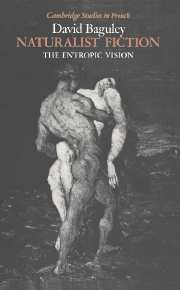Book contents
- Frontmatter
- Contents
- Acknowledgments
- Introduction
- 1 Histories
- 2 Theories: realism, naturalism, genre
- 3 The founding texts
- 4 The tragic model
- 5 Comic strains
- 6 In the ironic modes: naturalist satire and parody
- 7 The ‘scandal’ of naturalism
- 8 Naturalist description
- 9 The entropic vision
- 10 By way of conclusion: two English examples
- Notes
- Translations of passages in French
- Select bibliography
- Index
- Cambridge Studies in French
10 - By way of conclusion: two English examples
Published online by Cambridge University Press: 14 October 2009
- Frontmatter
- Contents
- Acknowledgments
- Introduction
- 1 Histories
- 2 Theories: realism, naturalism, genre
- 3 The founding texts
- 4 The tragic model
- 5 Comic strains
- 6 In the ironic modes: naturalist satire and parody
- 7 The ‘scandal’ of naturalism
- 8 Naturalist description
- 9 The entropic vision
- 10 By way of conclusion: two English examples
- Notes
- Translations of passages in French
- Select bibliography
- Index
- Cambridge Studies in French
Summary
It may well seem totally inappropriate to raise once again the question of the origins of genres in the conclusion of a book which has been dealing with genre all along. Yet, unless one denies the reality of their interrelatedness, the problem of the formation of genres is essentially the same as that of their so-called demise. In each case, of course, the circumstances are different, but the process is no doubt equivalent, for – to take the simplest possible scenario – as one genre loses its prestigious hold on the literary scene, another genre emerges into prominence. For two of the most conventional views of genre the problem never arises: if genres are considered to be permanent archetypal structures, then they lie outside the pale of historical development; if they are examined exclusively as historical events, as has often been the case in studies of the naturalist movement, then their origins are merely dated by some historical occurrence like the Trapp dinner or the ‘Manifeste des Cinq’.
The question remains a thorny one. ‘This is not an easy question to handle’, writes Christopher Prendergast. ‘One of the most sophisticated attempts to answer it (Todorov's) comes up with the perhaps somewhat unenlightening conclusion that the origin of genres is genres. There is indeed a chicken-and-egg dimension to the problem.’ Or indeed, if one genre does in fact produce a different genre, how does the chicken produce a duck egg?
- Type
- Chapter
- Information
- Naturalist FictionThe Entropic Vision, pp. 224 - 234Publisher: Cambridge University PressPrint publication year: 1990

